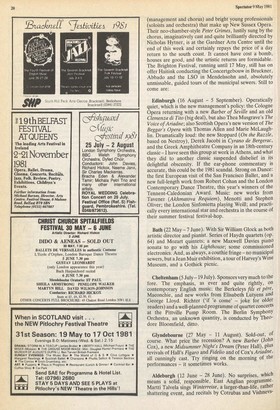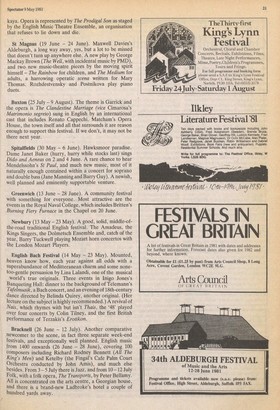Festivals 81
The show still goes on
Rodney Aldnes
The recession, does it bite? Not all that noticeably on the festival scene. While planning committees must have been experiencing hideous traumas over the last twelve months, upper lips remain stiff and the show goes on. Only a professional statistician could work out that there are in fact fewer events at Edinburgh this year, so it is generous of the director, John Drummond, to spill the beans and save us the trouble of counting. Is it to the advantage of organisers to lie low and say nothing, or to display recessional tooth marks on their calves and play for sympathy? Probably the former: the British are notoriously uncompassionate towards un-canine underdogs and part of the Thatcherite ethos is abandonment of sympathy in any form. Mr Heath's lame ducks have suffered as much in the way of multiple amputation as is biologically feasible.
One visible result of the shortage of public funds is the greater prominence of private sponsors, notice of whose worthy contributions used to be found in the small print on the back of the programme. Now brochures are ablaze with 'logos'. Why not? Only the organisers themselves can decide whether the rewards handed out are commensurate with the baubles received, and this is certainly not the year to ask too many questions. Questions have had to be asked, for one, at Buxton, whose season last year was of Icarian splendour and, alas, over-confidence. The lesson, that to put luxurious fare before the public regardless of the prices on the menu is not enough, has been learnt the hard way: horns have been drawn in (only one opera this year), management heads, some of them very well-coiffed, have rolled. I persist in believing that Buxton remains potentially one of the most exciting new ventures on the festival scene, and the withdrawal of admittedly only measly Arts Council support is one of the more incomprehensible of that body's many incomprehensible actions. They have always said they were deeply into regional expansion, but have here nervously contracted.
Opera, the single most expensive festival commodity, is the biggest problem; it is not lightly to be dispensed with because, even allowing for my bias, it remains a box-office draw. Gone are the days when every regional festival had opera on the front page of its brochure, but there are ways round this one. A successful undertaking such as Maxwell Davies's The Lighthouse, first seen at Edinburgh last year, has been dusted down this year and is on show at Bath and Aldeburgh. The ever-increasing output of the regional companies is there tactfully to be tapped: the Welsh National supplies the opera at Cheltenham, not only their reputedly toned-down Rodelinda (worth anyone's money whether toned-down or not) but also their new commission, The Journey by John Metcalf. Perhaps the most impressive solution has been that lighted upon by Brighton the harnessing of the imaginative amateur talent (management and chorus) and bright young professionals (soloists and orchestra) that make up New Sussex Opera. Their neo-chamber-style Peter Grimes, lustily sung by the chorus, imaginatively cast and quite brilliantly directed by Nicholas Hytner, is at the Gardner Arts Centre until the end of this week and certainly repays the price of a day return to the south coast. It cannot have cost a bomb, houses are good, and the artistic returns are formidable. The Brighton Festival, running until 17 May, still has on offer Haitink conducting the Concertgebouw in Bruckner, Abbado and the LSO in Mendelssohn and, absolutely unmissable, guided tours of the municipal sewers. Still to come are: Edinburgh (16 August — 5 September). Operatically quiet, which is the new management's policy: the Cologne Opera returning with a new Barber of Seville and an old Clemenza di Tito (big deal), but also Thea Musgrave's The Voice of Ariadne; also Scottish Opera's new version of The Beggar's Opera with Thomas Allen and Marie McLaughlin. Dramatically loud: the new Stoppard (On the Razzle, based on Nestroy), Derek Jacobi in Cyrano de Bergerac, and the Greek Amphitheatre Company in an 18th-century classic— I have seen this group at work in Athens, and what they did to another classic suspended disbelief in its delightful obscenity. If the ear-phone commentary is accurate, this could be the 1981 scandal. Strong on Dance: the first European visit of the San Francisco Ballet, and a new full-length work from Robert Cohan and the London Contemporary Dance Theatre, this year's winners of the Tennent-Caledonian Award. Music: new works from Tavener (Akhmatova Requiem), Menotti and Stephen Oliver; the London Sinfonietta playing Weill; and practically every international star and orchestra in the course of their summer festival festival-hop.
Bath (22 May —7 June). With Sir William Glock as both artistic director and pianist. Series of Haydn quartets (op. 64) and Mozart quintets; a new Maxwell Davies piano sonata to go with his Lighthouse; some commissioned electronics. And, as always, a couthie fringe — no municipal sewers, but a Jean Muir exhibition, a tour of Harvey's Wine Museum, and a Gothick picnic.
Cheltenham (5 July — 19 July). Sponsors very much to the fore. The emphasis, as ever and quite rightly, on contemporary English music: the Berkeleys fils et pere, Maconchie, and new works from Elisabeth Lutyens and George Lloyd. Richter Cif 'e come' — joke for older readers) and a well-planned programme of quartet concerts at the Pittville Pump Room. The Berlin Symphony Orchestra, an unknown quantity, is conducted by Theodore Bloomfield, ditto.
Glyndebourne (27 May — 11 August). Sold-out, of course. What price the recession? A new Barber (John Cox), a new Midsummer Night's Dream (Peter Hall), plus revivals of Hall's Figaro and Fidelio and of Cox's Ariadne, all cunningly cast. Try ringing on the morning of the performances — it sometimes works.
Aldeburgh (12 June — 28 June). No surprises, which means a solid, responsible, East Anglian programme. Martti Talvela sings Winterreise, a larger-than-life, rather shattering event, and recitals by Cotrubas and Vishnevs kaya. Opera is represented by The Prodigal Son as staged by the English Music Theatre Ensemble, an organisation that refuses to lie down and die.
St Magnus (19 June — 24 June). Maxwell Davies's Aldeburgh, a long way away, yes, but a lot to be missed that doesn't turn up anywhere else. A new play by George Mackay Brown (The Well, with incidental music by PMD), and two new music-theatre pieces by the moving spirit himself — The Rainbow for children, and The Medium for adults, a harrowing operatic scena written for Mary Thomas. Rozhdestvensky and Postnikova play piano duets.
Buxton (25 July — 9 August). The theme is Garrick and the opera is The Clandestine Marriage (vice Cimarosa's Matrimonio segreto) sung in English by an international cast that includes Renato Cappechi. Matcham's Opera House, the town itself and all that surrounds it are reason enough to support this festival. If we don't, it may not be there next year.
Spitalfields (30 May — 6 June). Hawksmoor paradise. Dame Janet Baker (hurry, hurry while stocks last) sings Dido and Aeneas on 2 and 4 June. A rare chance to hear Mendelssohn's St Paul, and much new music, most of it naturally enough contained within a concert for soprano and double bass (Jane Manning and Barry Guy). A newish, well planned and eminently supportable venture.
Greenwich (13 June — 28 June). A community festival with something for everyone. Most attractive are the events in the Royal Naval College, which includes Britten's Burning Fiery Furnace in the Chapel on 20 June.
Newbury (13 May — 23 May). A good, solid, middle-ofthe-road traditional English festival. The Amadeus, the Kings Singers, the Dolmetsch Ensemble and, catch of the year, Barry Tuckwell playing Mozart horn concertos with the London Mozart Players.
English Bach Festival (14 May — 23 May). Mounted, heaven know how, each year against all odds with a superabundance of Meditteranean charm and some nonetoo-gentle persuasion by Lina Lalandi, one of the musical world's true originals. Three events in Inigo Jones's Banqueting Hall: dinner to the background of Telemann's Tafebnusik, a Bach concert, and an evening of 18th-century dance directed by Belinda Ouirey, another original. (Her lecture on the subject is highly recommended.) A revival of Nais, which rhymes with but isn't Thais, the '48' played ovej four concerts by Colin Tilney, and the first British performance of Terzakis's Erotikon.
Bracknell (26 June — 12 July). Another comparative newcomer to the scene, in fact three separate week-end festivals, and exceptionally well planned. English music from 1400 onwards (26 June — 28 June), covering 100 composers including Richard Rodney Bennett (All The King's Men) and Ketelby (the Fingal's Cafe Palm Court Orchestra conducted by John Amis), and much else besides. From 3 — 5 July there is Jazz, and from 10 12 July Folk, with a folk opera, The Transports, by Peter Bellamy. All is concentrated on the arts centre, a Georgian house, and there is a brand-new Ladbroke's hotel a couple of hundred yards away.












































 Previous page
Previous page